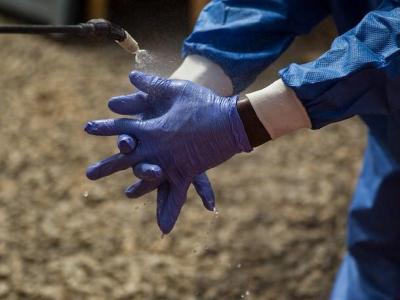An environmental investigation in an Arizona romaine-growing area near Yuma that was linked to a large Escherichia coli O157:H7 outbreak earlier this year confirmed the outbreak strain in samples of irrigation canal water, which probably contaminated the lettuce.
The US Food and Drug Administration (FDA) yesterday released a report that detailed findings from federal and Arizona officials who visited the area several times over the summer. The event marked the nation's largest E coli outbreak since 2006, with reports of 210 illnesses from 36 states. Ninety-six patients were hospitalized, 27 had hemolytic uremic syndrome (HUS), a potentially fatal kidney complication, and five people died.
FDA Commissioner Scott Gottlieb, MD, said in a statement yesterday that the agency is committed to taking steps to prevent similar outbreaks in the future and improve the safety of leafy greens. "Since the next romaine growing season for the Yuma region is underway, it's critical for all of us to understand what happened so we can identify the changes that can prevent future outbreaks and reduce the scope of any problems that could arise," he said.
Water contamination source still a mystery
The investigation team, led by the FDA, visited the Yuma growing area several times from June through August and collected numerous environmental samples. However, the only ones that tested positive for the outbreak strain were collected in early June from a 3.5-mile stretch of an irrigation canal near Wellton in Yuma County that delivers water to farms. The growing season had ended weeks before the probe, so no leafy greens samples could be tested.
Besides testing irrigation water, the team visited farms to look at other possible factors, including soil amendments, growing and harvesting practices, animal intrusion, adjacent land use, and employee health and hygiene practices. They also examined potential contamination sources at manufacturing and processing operations.
Despite extensive environmental sampling, only the three irrigation water samples were positive. There was a large concentrated animal feeding operation (CAFO) adjacent to the stretch of canal where water tested positive, but investigators didn't find an obvious route for contamination, and a limited number of samples from the operation didn't yield the outbreak strain.
The team wasn't able to determine how the water may have contaminated the lettuce, though they said possibilities include direct application of irrigation water or use of the water to dilute chemicals applied to crops during aerial and land-based spraying. They also said they couldn't rule out other possible contamination sources that didn't turn up during the investigation.
Recommendations for growers and processors
Along with its investigation report, the FDA included a list of recommendations for leafy-greens producers, including assuring that agricultural water is safe for its intended use and assessing potential direct or indirect contamination risks near growing fields.
Officials also urged government and nongovernmental groups, including those in Imperial and Yuma counties, to explore other possible sources or routes of contamination. "This information is critical to developing and implementing short- and long-term remediation measures to reduce the potential for another outbreak associated with leafy greens or other fresh produce commodities," the authors wrote.
Consumer group raises concerns about produce rule delays
In a statement yesterday on the FDA's report, Sarah Sorscher, JD, MPH, regulatory affairs director for the Center for Science in the Public Interest (CSPI), said the findings regarding contaminated irrigation water underscore a need for the FDA to fully implement the produce safety rule issued as part of the Food Safety Modernization Act.
She noted that in September 2017 the FDA announced plans to delay water testing and other requirements under the produce safety rule while considering ways to reduce regulations or increase flexibility. The CSPI opposed delaying the rule, which requires farmers to test water to identify high levels of fecal contamination and institute measures to prevent tainted water from being used on produce.
Sorscher said it's not clear from the report if affected farms were already testing water, as some produce industry members have agreed to do voluntarily.
The CSPI also raised concerns about the report's finding that a lack of clear recordkeeping was a hurdle in the probe. "Yet the agency has delayed implementing FSMA’s requirements for enhanced recordkeeping. CSPI has previously urged the agency to move forward with these requirements to help ensure faster traceback during outbreaks of foodborne illness," she said.
See also:
Nov 1 FDA statement
Nov 1 FDA environmental assessment
Nov 1 CSPI statement


















